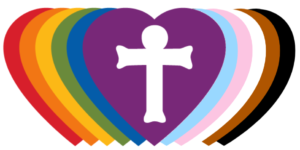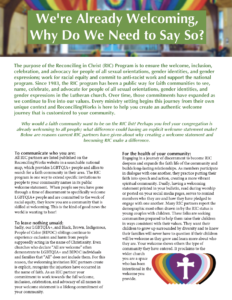We're Already Welcoming,
Why Do We Need to Say So?
The purpose of the Reconciling in Christ (RIC) Program is to ensure the welcome, inclusion, celebration, and advocacy for people of all sexual orientations, gender identities, and gender expressions; work for racial equity and commit to anti-racist work and support the national program. Since 1983, the RIC program has been a public way for faith communities to see, name, celebrate, and advocate for people of all sexual orientations, gender identities, and gender expressions in the Lutheran church. Over time, those commitments have expanded as we continue to live into our values. Every ministry setting begins this journey from their own unique context and ReconcilingWorks is here to help you create an authentic welcome journey that is customized to your community.
Why would a faith community want to be on the RIC list? Perhaps you feel your congregation is already welcoming to all people; what difference could having an explicit welcome statement make? Below are reasons current RIC partners have given about why creating a welcome statement and becoming RIC make a difference.
To communicate who you are:
All RIC partners are listed published on the ReconcilingWorks website in a searchable national map, which provides LGBTQIA+ people and allies to search for a faith community in their area. The RIC program is one way to extend specific invitations to people to your community names in its public welcome statement. When people see you have gone through a time of discernment to specifically welcome LGBTQIA+ people and are committed to the work of racial equity, they know you are a community that is skilled at welcoming. This is the kind of good news the world is wanting to hear!
To leave nothing unsaid:
Sadly, our LGBTQIA+, and Black, Brown, Indigenous, People of Color (BIPOC) siblings continue to experience exclusion and harm from people supposedly acting in the name of Christianity. Even churches who declare “All are welcome” often demonstrate to LGBTQIA+ and BIPOC individuals and families that “All” does not include them. For this reason, the welcoming invitation RIC partners create is explicit, recognize the injustices have occurred in the name of faith. As an RIC partner your commitment to work towards the full welcome, inclusion, celebration, and advocacy of all names in your welcome statement is a lifelong commitment of your community.
For the health of your community:
Engaging in a journey of discernment to become RIC deepens and expands the faith life of the community and builds long-lasting relationships. As members participate in dialogue with one another, they practice putting their faith into speech and action, creating a more vibrant spiritual community. Dually, having a welcoming statement printed in your bulletin, read during worship or posted on your social media pages, serves to remind members who they are and how they have pledged to engage with one another. Many RIC partners report the demographic most often drawn in by the RIC status is young couples with children. These folks are seeking communities prepared to help them raise their children in ways consistent with their values. They want their children to grow up surrounded by diversity and to know their families will never have to question if their children will be welcome as they grow and learn more about who they are. Your welcome shows others the type of community they have entered. It proclaims to the wider church you are a space who has been intentional in the welcome you provide.
Setting RIC Milestones
ReconcilingWorks believes intersectional welcome is a lifelong journey. Whether your RIC Faith Community has been doing this work for 30 years, or you joined the RIC community last month, there are always ways to deepen and expand our welcome to God’s beloveds. There are countless milestones to set for your faith community as a way to welcome, include, celebrate, and advocate for people of all sexual orientations, gender identities, and gender expressions; as well as people who are Black, Brown, Indigenous People of Color (BIPOC). This welcome extends to their families, and other communities who have been “othered” by the church. Incorporating welcome into the life of your faith community will take time. These milestones will be reached through ongoing education, relationship building, and committed partnership with ReconcilingWorks.
Questions to inspire new milestones:
- Does my faith community have openly LGBTQIA+ or BIPOC rostered leaders, staff, or lay members in roles of authority and influence?
- Does our worship life reflect the diversity of God's creation in hymnody, leadership, imagery, and language?
- Is our welcome statement reflected in how we live out our values as a community? How is is shared, taught, and upheld by members and guests of all ages?
- How does our children, youth, and family ministry live into our values stated in our welcome statement? Have we prepared our staff and families on welcoming and supporting our LGBTQIA+ and BIPOC siblings?
- Does my faith community partner with community organizations who share similar values as named in our welcome statement?
- How does our faith community share the good news of our welcome? Can people easily see our welcome from the outside of our building, in our online presence, and when they enter? What images have we displayed to indicate our values? (For example, using the RIC logo, the progressive pride flag, special RIC banners from ReconcilingWorks, images of diverse families, etc.) Do we offer safe and accessible spaces inside our building for people to experience our community fully?
- Has our community made a contribution to ReconcilingWorks to further support the RIC ministry and its longevity?
What are some exciting new milestones your faith community can set for itself?
Other helpful resources include:
- To connect with Reconciling in Christ Program Coordinator to discuss your faith community's specific journey, schedule a Zoom meeting at ReconcilingWorks.org/RICinfo
- One way to expand your welcome to all of God's Beloveds is by using pronouns. For helpful tips around why pronouns matter, be sure to bookmark ReconcilingWorks.org/Pronouns
- Find helpful resources and tools to set new RIC milestones in the Building an Inclusive Church (BIC) Toolkit, found at ReconcilingWorks.org/BIC
- To support your lifelong journey of intersectional welcome, ReconcilingWorks has great resources to support your faith community in new learning and awareness on intersectional justice work at ReconcilingWorks.org/Injustice


